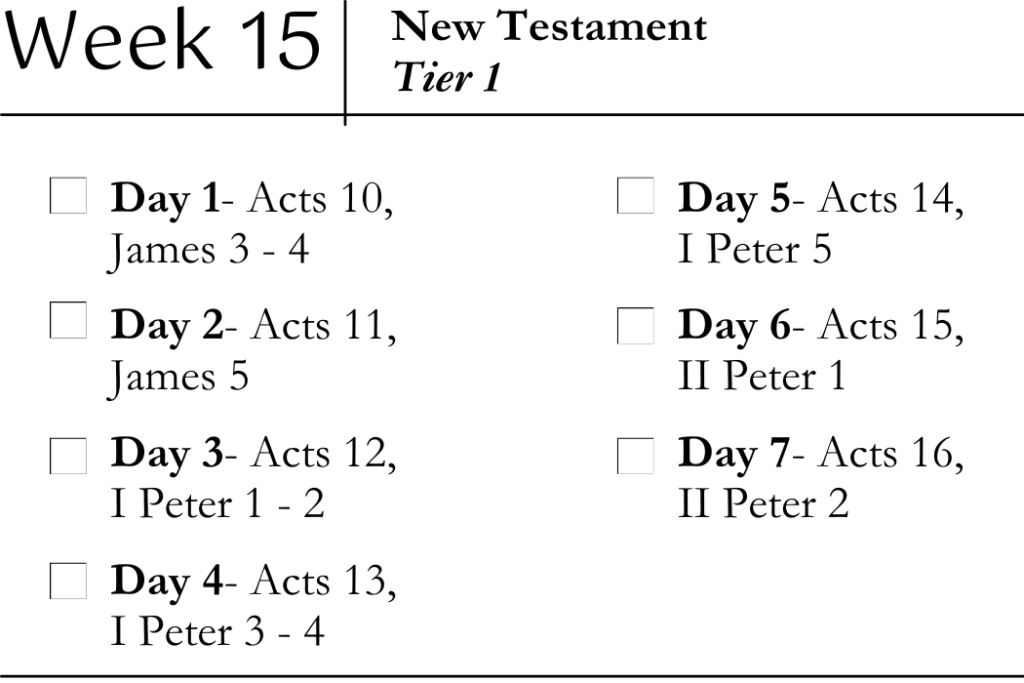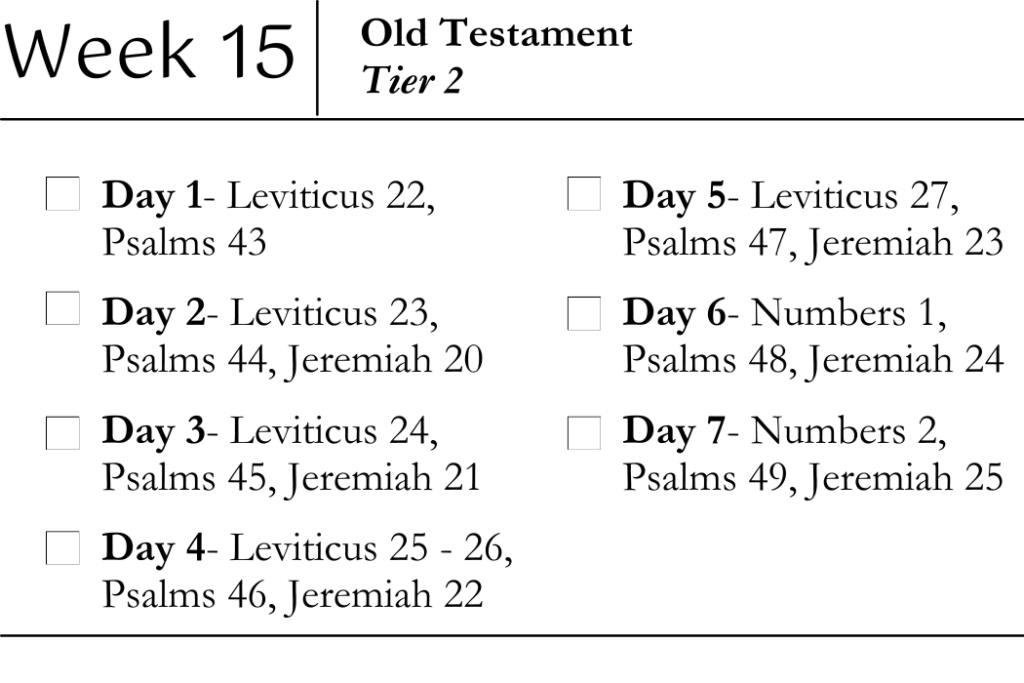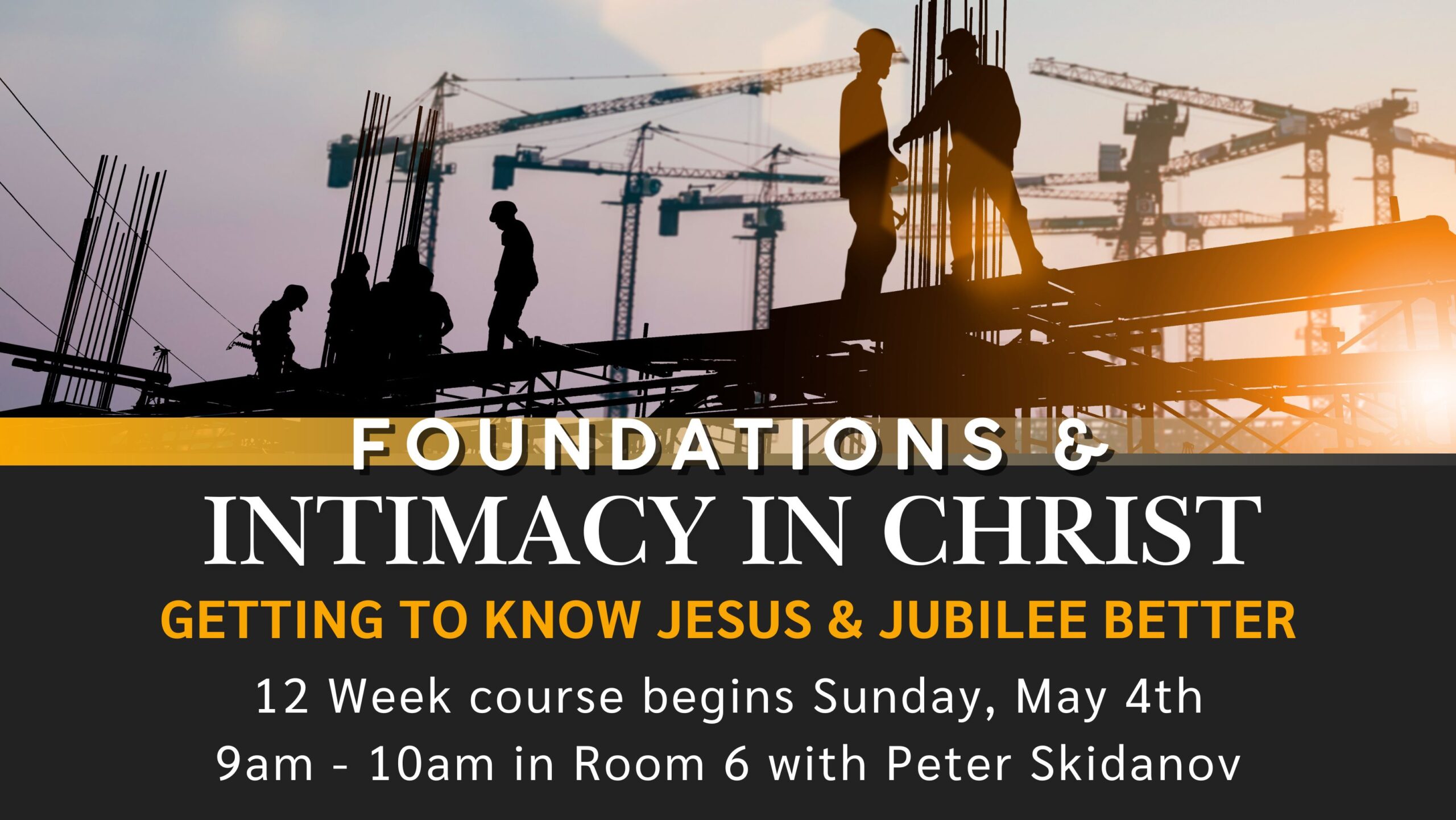Your word is a lamp to my feet and a light to my path.
We are in Acts, James, 1 Peter, and 2 Peter this week. In two weeks, we will begin the New Testament for the second time. We continue our journey through Leviticus and Psalms. Priests, prophets, and kings are confronting Jeremiah, but God still pleads with the nation through Jeremiah.
Our reading of the Bible is God’s means for us to enter His rest. Whether we see and understand all we read is not the point. Many times, the scriptures will confound our intellect. They are spirit and they are life. Leviticus can be overwhelming or boring. But, if we listen to the Spirit, the scriptures set boundaries, which are all fulfilled in Christ. To honor God is to honor His word. To keep His word is to value His word. He knows we cannot do it; but if we value His word and look to see Jesus in His word, we will find Him—our eyes on Jesus.
WATCH That I May Know Him Week 15 PODCAST

ACTS
Acts 10 – 16
Chapters 10 and 11 are super relevant to us who are Gentiles. Here is where God enlarges the church’s vision from only Jews to all nations. Here He finds Peter and enlarges His understanding from the past to the present truth of God’s repentance to life, confirming it with the demonstration of the Holy Spirit and power. The church is growing in Antioch. They send Barnabas and Saul (Paul) with relief to Jerusalem at the exact time Herod arrests Peter and plans to put him to death. Prayers are made and miracles happen. Peter is delivered and Herod is judged. Barnabas and Saul (Paul) bring back what they have seen in prayer and set aside time with the prophets and teachers in Antioch. The Spirit speaks and another paradigm is enlarged, the Missionary Movement.
Chapter 14 brings Paul and Barnabas home to Antioch with all the reports of converts, churches, and miracles. In Chapter 15, the Gentiles are being converted and told by some that they must be circumcised and become Jewish. Paul and Barnabas are sent to Jerusalem to settle this matter, and grace prevails. Gentiles are given four simple practices to observe, “That you abstain from things offered to idols, from blood, from things strangled, and from sexual immorality. If you keep yourselves from these, you will do well” (Acts 15:29). Chapter 16, Paul and Barnabas separate out of love and principle. Barnabas the encourager, wants to give Mark a second chance at missions, but Paul won’t have it. God has bigger plans; Mark will become a great asset to Paul in later days because Barnabas wouldn’t give up on the man. A second mission trip begins and we encounter the famous prison breaks, where God shakes the foundations because of Paul and Silas’ prayers and praise.
EPISTLES
James 3 – 5
James is calling us to submit our tongues to God and not curse man, who is made in His image. We see a vital truth for today with the promise that we will see in 1 Peter 3. There is earthly wisdom that is filled with confusion and every evil thing. There is also wisdom from above that is pure and peaceable, gentle, willing to yield, full of mercy and good fruits. Chapter 4 is a call to humility. Chapter 5 is a call to patience and prayer. James, the brother of Jesus, has a commanding call to Christ-likeness.
1 Peter 1 – 5
Chapter 1 shares our inheritance, testings, holiness, and the enduring word. Chapter 2 reveals who we have become in Jesus: a spiritual house, a holy priesthood to offer up spiritual sacrifices acceptable to God through Jesus Christ. This Peter is a stark contrast to the Peter we knew in the gospels. He has matured. He is no longer headstrong; he is humble and submitted even to those who are wrong. He is following Jesus and understands now that grace comes to those suffering wrongfully and not complaining. Chapter 3 is help for marriages, and our call to blessing by not cursing, nor returning evil for evil. Now comes the reason our tongues (what we say) matter. Again, it is better to suffer for doing good than for doing evil.
2 Peter 1 – 2
In Chapter 1 we are given seven attributes to add one to the other: to our faith, virtue, to virtue knowledge, to knowledge self-control, to self-control perseverance, to perseverance godliness, to godliness, brotherly kindness, and to brotherly kindness love. So many blessings come to us in these additions. Take time and meditate on what each means and why they are added to the one prior. In Chapter 2, Peter deals with the false teachers, their doctrines, and depravity. It is a sobering chapter for these last days.

TORAH
Leviticus 22 – 27
In Chapter 22 are instructions to Aaron and his sons regarding holy things and offerings that are accepted and not accepted. The animal must not have a defect and it is to be given of our own free will. Chapter 23 is the listing of the seven annual feasts of the Lord, plus the weekly Sabbath. Jesus died on Passover. The Feast of Unleavened Bread to the Lord on the 15th day of the first month. He was raised on the Feast of First Fruits. Fifty days from His resurrection come the Feast of Weeks (Pentecost), the beginning of harvest, and the last of the seven feasts, which is Tabernacles the completion of the harvest season. Care of the Tabernacle and the eye for an eye law follow. Chapter 25 is the seventh year sabbath-rest for the land, followed by seven, seventh years (forty-nine), and then the 50th year is the year of Jubilee when everyone goes free. Jesus is our Jubilee. Provisions for these rest years, setting servants free, caring for the poor, and calculating the value of land based on proximity to the Jubilee year. All the land was given as an inheritance. No matter what happens, it is to be returned to the original family every 50 years.
Chapter 26 is the promise of blessing and retribution in keeping the commandments. Chapter 27 is redeeming property, persons, and tithes dedicated to the Lord. If something was devoted to the Lord, you could redeem it at its full value plus twenty percent. This is a genius chapter calling us to consider our devoting of things seriously.
Numbers 1 – 2
One month from the erecting of the Tabernacle in Exodus Chapter 40, the priesthood is established in Leviticus. Now on the first day of the second month, Moses is instructed to take a census of every male, 20 years old and above. This will determine the allotment of inheritance that each tribe is to receive. The Levites were not to be counted because they were to take care of the Tabernacle of the Testimony and all its furnishings.
POETRY
Psalms 43 – 49
“Oh, send out Your light and Your truth!” (Ps. 43:3). “You are my King, O God; Command victories for Jacob” (Ps. 44:4). “My heart is overflowing with a good theme; I recite my composition concerning the King; my tongue is the pen of a ready writer” (Ps. 45:1). “God is a refuge and strength, a very present help in trouble” (46:1). “Oh clap your hands, all you peoples! Shout to God with a voice of triumph!” (Ps. 47:1). “Great is the Lord and greatly to be praised” (Ps. 48:1). “But God will redeem my soul from the power of the grave, for He shall receive me” (Ps 49:15).
PROPHETS
Jeremiah 20 – 25
Jeremiah once again is in a crisis. He is mocked and derided, but if he tries to keep silent, God’s word in his heart becomes like a burning fire shut up in his bones, and he cannot hold it back. King Zedekiah seeks a good word from the Lord from Jeremiah but does not receive one, except to “Execute judgment in the morning; and deliver him who is plundered out of the hand of the oppressor, lest My fury go forth like fire and burn so that no one can quench it, because of the evil of your doings” (Jeremiah 21:12).
In Chapter 22, the Lord repeats what it means to know the Lord and act as a king. “Thus says the Lord: Execute judgment and righteousness and deliver the plundered out of the hand of the oppressor. Do no wrong and do no violence to the stranger, the fatherless, or the widow, nor shed innocent blood in this place. For if you do this thing then shall enter the gate of this house, riding on horses and in chariots, accompanied by servants and people, kings who sit on the throne of David” (Jeremiah 22:3, 4).
In Chapter 23, the Lord prophesies the days that are coming, “That I will raise to David a Branch of righteousness; A King shall reign and prosper, and execute judgment and righteousness in the earth. In his days Judah will dwell safely; now this is His name by which He will be called: THE LORD OUR RIGHTEOUSNESS” (Jeremiah 23:5, 6). But there are false prophets who are saying that Israel will see no evil and give worthless words because they tell Israel everything is good, though Israel walks according to the dictates of his own heart. Prophets who speak peace, without calling His people out of their sins, are worthless prophets prophesying peace when there is no peace. No wonder Jeremiah was in crisis. What an unthankful task to tell God’s people that what they are doing has consequences.
In Chapter 24, Jeremiah is given a vision of two baskets of figs. One basket of very good figs and one of very bad figs which cannot be eaten. The basket of the good figs is those who have gone into exile and will be brought back to Jerusalem in peace. The basket of bad figs is the ones who stay in Jerusalem thinking they will escape destruction. To those whom God will bring back, He says, “Then I will give them a heart to know Me, that I am the Lord; and they shall be My people, and I will be their God, for they shall return to Me with their whole heart” (Jeremiah 24:7).
In Chapter 25, Jeremiah recounts to Israel that this is the 23rd year of the Lord calling him to rise early and speak to Israel, but they have not listened. Jeremiah’s—and all the prophets before him—message was, “Repent now everyone of his evil way and evil doings, and dwell in the land the Lord has given you and your fathers forever and ever. Do not go after other gods to serve them and worship them, and do not provoke Me to anger with the works of your hands, and I will not harm you” (Jeremiah 25:5, 6). But, they have not listened, so the Lord proclaims He is sending His servant Nebuchadnezzar to take them into exile and leave the land desolate for 70 years. A description of desolation in verse 10 will become a declaration of the Lord’s restoration of the land in Chapter 33. All judgment is to bring restoration and redemption through repentance. The chapter ends with Jeremiah giving the wine cup of God’s fury to all the surrounding nations. God is a just God.




